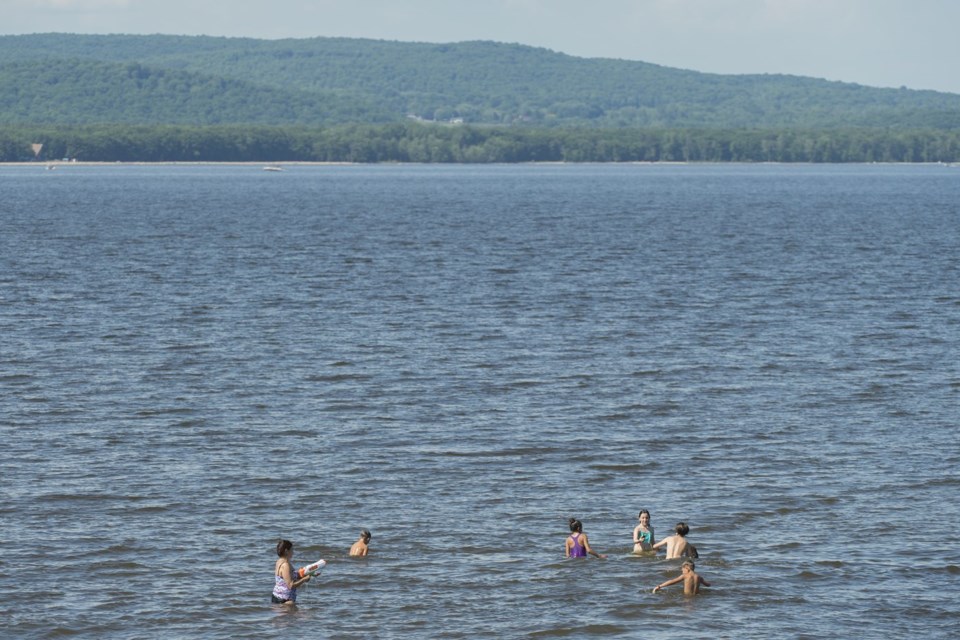MONTREAL ŌĆö The Quebec government is going to court to fight the dumping of contaminated soil along the shores of a lake in the Mohawk community of Kanesatake, west of Montreal.
Following an operation last month to collect soil samples and inspect several sites along the banks of the Lake of Two Mountains, the Environment Department is seeking an injunction in Quebec Superior Court to stop the dumping of soil and other waste on 17 properties.
The move follows months of media coverage and public pressure from community members, who say illegal dumping has been a problem in Kanesatake for years. The government says it starting looking into the issue after receiving complaints from residents last fall.
The application for an injunction names 17 defendants, mostly Kanesatake residents, and two companies that did work on the properties where the dumping allegedly occurred. However, it does not name other construction companies whose trucks were frequently seen transporting soil to the Mohawk territory.
The document alleges the defendants committed "numerous violations" of Quebec environmental regulations on their land, including cutting down trees, backfilling, depositing contaminated soil and erecting buildings on the shores of the lake. It says some of the soil samples collected last month were contaminated with hydrocarbons.
"These illegal activities ŌĆ” pose a particular risk for living organisms, for the health of the aquatic ecosystem in the vicinity and pose a serious threat to environmental quality," the government claims.
According to the application, the Environment Department received complaints about the dumping of possibly contaminated soil in Kanesatake in the summer and fall of 2023, but a soil-sampling operation planned for December was cancelled because of bad weather. Another attempt in May was cut short after a physical altercation between an employee on one of the properties and two Mohawk Council of Kanesatake chiefs.
The department says it sent letters in June to trucking companies in the Montreal area informing them that there are "no authorized sites" for contaminated soil disposal in Kanesatake, but the problem continued.
The inspections carried out last month revealed the defendants were using the soil to backfill along the waterfront, and in some cases then erected new buildings on the soil, the government alleges. An affidavit from a government investigator names two cannabis dispensaries that have been built along the filled-in shoreline.
The court document claims that as the soil erodes into the lake, it could lower oxygen levels in the water and hurt fish and invertebrate populations. The government says it's urgent to put a stop to the soil dumping because of "the large number of trucks accessing the site every day."
But the injunction request mainly focuses on residents, not on the companies transporting soil to the Mohawk territory. Media reports earlier this year documented a steady flow of trucks delivering loads of soil to Kanesatake from construction sites in the Montreal area, including many from Nexus Construction and Les Grands Travaux de Montr├®al. The companies are not named in the court filing.
Only two companies, Les Entreprises Translogik and Excavation Denis Dagenais, are named as defendants. The government alleges they were involved in backfilling the shoreline. Reached by phone, Hugo Dagenais, who runs Excavation Denis Dagenais, declined to be interviewed.
In an affidavit, an Environment Department official claimed it took a long time to plan the inspections, in part because of security concerns, and in part because the Mohawk Council of Kanesatake is divided into "two factions," which slowed down communication.
Illegal dumping in Kanesatake has been a long-standing concern. The Quebec government granted a permit in 2015 to brothers Gary and Robert Gabriel to operate an industrial recycling centre on the territory. But the province revoked the permit and ordered the site to shut down in 2020, after inspections found the volume of waste vastly exceeded the authorized limit and was leaking black, contaminated water into the environment.
Robert Gabriel is one of the defendants named in the new court filing. He is listed as the owner of High Times, a cannabis store built on the backfilled shoreline.
Government lawyers were in court in St-J├®r├┤me, Que., on Wednesday, but the judge postponed the hearing until Oct. 7 to give the defendants time to find lawyers.
This report by The 91įŁ┤┤ Press was first published Sept. 26, 2024.
Maura Forrest, The 91įŁ┤┤ Press



